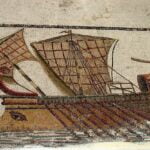In 75 BCE, while travelling to Rhodes to study with Apolloninos Molon, the 25-year-old Gaius Julius Caesar was kidnapped by Cilician pirates (praedo). The Cilicians, inhabiting what is now southeastern Turkey, according to Plutarch, were “the most murderous of men”.
Piracy was widespread in the Mediterranean. The Roman elites had a large part in this, they did not send the Roman fleet against the pirates, because they provided a constant supply of slaves, who were then used as labour on huge estates in Italy.
A well-known anecdote, given by Plutarch, says that Caesar, kidnapped by pirates, burst out laughing when the pirates wanted 20 talents of silver for him. He stated that this was too low an amount for his head and offered a ransom of 50 talents – about 1,300 kg of silver.
Caesar then sent his henchmen to various cities in Asia to collect the requested ransom. With Caesar in captivity remained his friend and two slaves. Caesar is said to have been very arrogant and self-confident because he could point out to the pirates that they were talking too loudly and did not let him sleep.
Caesar was supposed to be in captivity for 38 days, during which time he played, exercised and wrote poems or speeches. When he delivered his texts to the pirates, they mocked young Caesar. The furious Roman called them illiterate and savages and promised that one day he would crucify them.
When ransom arrived from the Greek city of Miletus, Caesar was released. The money was probably raised thanks to the clients (clientes) of Caesar’s father, who once held the office of praetor in Asia.
Immediately after his release, Caesar rallied the Greeks, who were hostile to the pirates, and took revenge. He came to the island, took all the pirates captive and imprisoned them in Pergamum. Then he went to the governor of the province of Asia and the praetor Marcus Junius Silanus, so that he would decide on the punishment for the pirates. However, on the information that the decision might not be made immediately, Caesar decided to administer justice himself. He crucified all the Cilicians, as he foretold in captivity.







